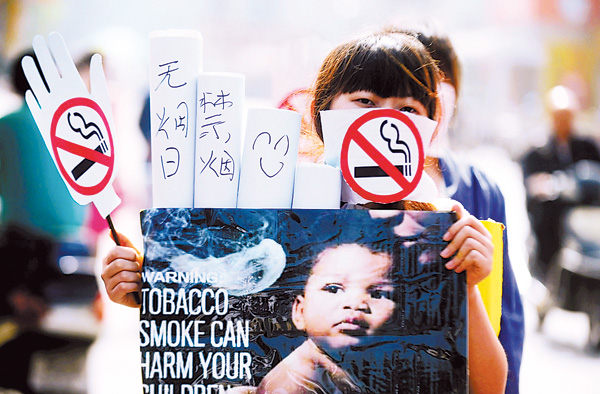

 |
| A student from Yangzhou University demonstrates against smoking during a street campaign in Yangzhou, Jiangsu province, on Sunday. [Photo by Meng Delong / For China Daily] |
Starting today, all indoor public places and many outdoor public places in Beijing are required to be 100-percent smoke-free, including primary and middle schools, seating areas of sports stadiums and hospitals that treat women or children.
Violators will face fines of up to 200 yuan ($32), and owners of the establishment will face penalties up to 10,000 yuan.
"Beijing has now set the bar very high — and we now look forward to other cities around China, and the world, following Beijing's excellent example," said Bernhard Schwartlander, WHO representative in China.
The Beijing government is training several thousand inspectors who will be responsible for inspecting venues and issuing fines, and thousands of community volunteers will also be mobilized to support enforcement, according to the WHO China Country Office.
Zhang Jianshu, president of the Beijing Tobacco Control Association, said it would be difficult to enforce the law in some areas where smoking is prevalent, such as nightclubs.
"The key lies in business owners," he added. "They have the responsibility to ensure no smoking within their establishments."
On Sunday, Beijing was honored with the World No Tobacco Day Award for its leadership in adopting a tough new tobacco control law, said Shin Young-soo, regional director for the World Health Organization Western Pacific Regional Office.
"(The award is) a wonderful gift to people of Beijing — the gift of clean air indoors, and a wonderful gift to children of Beijing on International Children's Day (June 1) — the gift of air free from secondhand smoke, the gift of health," said Shin.
Wang Benjin, deputy director of the Beijing Health Inspection Bureau, said that relying on penalties to curb smoking is not enough.
"We hope that more smokers are willing to quit not because of harsh rules, but because of their awareness of the harm caused by smoking," Wang said.
China has more than 300 million smokers, and more than 1 million people die each year due to smoking-related diseases, according to the National Health and Family Planning Commission.
Just ahead of the regulation taking effect, Beijing MTR Corp put up tobacco control posters on all trains on Subway Line 4 as part of the smoke-free campaign by the WHO.
"I noticed the posters in the subway on my way to work," said Wang, who has been smoking for more than 10 years. "It might not be easy to quit smoking right away, but I won't be smoking in nonsmoking areas for sure."
Beijing is home to about 4.2 million smokers, accounting for 23.4 percent of people aged 15 and above. They smoke an average of 14.6 cigarettes per day, according to a survey conducted by the Beijing Center for Disease Control last year.
"We call on all Beijingers to get behind the city health authorities' efforts to enforce the law," Schwartlander said. "All of us have a role to play. If you see someone smoking in a restaurant, tell them to stop."
 J-11 fighters in air exercise
J-11 fighters in air exercise Beauties dancing on the rings
Beauties dancing on the rings Attendants-to-be join Mr. & Miss Campus Contest
Attendants-to-be join Mr. & Miss Campus Contest Beijing's toughest anti-smoking law takes effect
Beijing's toughest anti-smoking law takes effect Family lives in cave for about 50 years in SW China
Family lives in cave for about 50 years in SW China PLA soldiers operating vehicle-mounted guns in drill
PLA soldiers operating vehicle-mounted guns in drill Blind carpenter in E China's Jiangxi
Blind carpenter in E China's Jiangxi China hosts overseas disaster relief exercise for the first time
China hosts overseas disaster relief exercise for the first time 20 pairs of twins who will become flight attendants in Sichuan
20 pairs of twins who will become flight attendants in Sichuan Obama is sowing discontent in S.China Sea
Obama is sowing discontent in S.China Sea Rescuers work through night to reach cruise ship survivors
Rescuers work through night to reach cruise ship survivors Driving through limbo
Driving through limbo Facing down MERS
Facing down MERSDay|Week